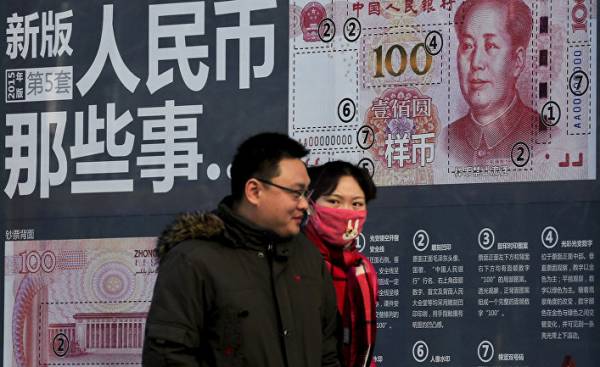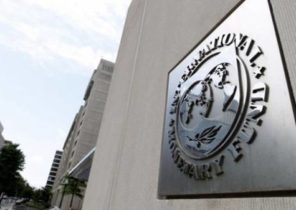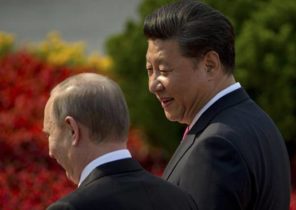
The modern China is firmly entrenched image of a large machine that is able only to modify and replicate the achievements of others. But now, it seems, for the Chinese it is time to give the world his own invention, comparable in scale they have created a once paper, gunpowder and compass. China invents digital dictatorship.
Who is the mastermind?
Imagine a world where there is the higher mind, the eye of Providence, which knows more about you than you yourself. Evaluates your every action, even minor transgressions do not go unnoticed and are written for you in the negative. And good deeds to improve your karma. Mankind has long wondered about this: common place of any religion was the presence of postulate that you can deceive or be deceived, but the sky sees everything, and you will definitely be rewarded. This picture of the world many thousands of years existed only on the level of faith. But now, with the advent of new technologies, it is becoming a reality. The all-seeing eye of the XXI century came to China. And the name — system of social credit (社会信用体系).
A more accurate meaning translation of this term — a system of social trust. About the creation of a system of thought under the previous Chinese President Hu Jintao (胡锦涛), who ruled the country from 2002 to 2012. In 2007 he published “Some observations of the office of the state Council of China on the establishment of the system of social credit” (国务院办公厅关于社会信用体系国务院办公厅关于社会信用体系建设的若干意见).
The project was very similar to the extended scoring system — assessment of the borrower’s creditworthiness, which produces the FICO in the United States. “Using international experience, to improve the scoring system in credit, taxation, contract management, quality products” — such problem was put in the document.
After coming to power, XI Jinping (习近平), China’s state Council in 2014, issued a new document — “the Program of creation of system of social credit (2014-2020)” (国务院关于印发社会信用体系建设规划纲要(2014-2020年)的通知). In it, the system has changed beyond recognition.
It transpires from the programme that by 2020, not only every company, but every citizen of mainland China will be monitored and evaluated this system in real time. Trust rating of individuals will be tied to the internal passport (身份证). Ratings will be published in a centralized database in the Internet for free access.
Having a high rating will use a variety of social and economic benefits. And those who have a bad rating will have to suffer — they will fall all the power of administrative sanctions and restrictions. The main task, and it’s plain text specified in the “Program of the state Council” to “justify the trust enjoyed all the benefits, and lost the trust could not make a single step” (“让守信者处处受益让失信者寸步难行”).
In mid-December, 2016 XI Jinping at the meeting of the political Bureau of the CPC Central Committee, said: “To combat an acute problem of lack of confidence to take firm hold over the establishment of a system reliability evaluation, covering all of society. We need to improve as mechanisms to promote law-abiding and conscientious citizens, and mechanisms to punish those who violate the law and have lost trust that the person just didn’t dare, just couldn’t lose the trust.”
Of course, it is not known who is in the top leadership of China belongs to the idea of creating such a system. But given the fact that the system was transformed after the coming to power of a new generation of leaders, as well as the attention of the current Chairman of the China anti-corruption, we can assume that the mastermind of the all-seeing social credit XI.
Responsible for the creation and implementation of the system, apparently, the State Committee for development and reform Commission of the PRC (中华人民共和国国家发展和改革委员会). At least, it publishes various reports on the progress of the work on creation of system of social credit. Current work is supervised by the Deputy head of the Committee on development and reform Commission Lian Veylan (连维良). He also holds meetings with industry bodies and associations, brings to them the instructions received from the first persons of the country.
Magic city
The system is already running in pilot mode in about thirty cities in China. The worker in this case was the city of Rongcheng (荣成) in Shandong province (山东). All residents (670 thousand) given the initial rating of 1000 points. Then, depending on their behavior the rating either up or down. Fragmented information about the life and activities of the citizen comes from a municipal, commercial, law enforcement, the judiciary in a single information center where it is processed with big data technologies, and the rating of the citizen, respectively, either increases or decreases. At Rongcheng single information center analyzes, neither more nor less than 160 thousand various parameters of the 142 institutions. Actively encouraged and the system of denunciations. The citizen reported to be on any bad deeds of his neighbor, relies at least five points.
Any single document, which would be clearly stated what is possible and what is not and what it will be, the system is not intended. We only know that if your rating is more than 1,050 points, then you’re a model citizen and marked with three letters A. With a thousand points, you can count on AA. With deveciusagi — B. If the rating fell below 849 — you are already suspicious of the carrier of C rating, you will be expelled from service in state and municipal structures.
And those who have 599 points and below, nesdobrovat. Their record in the black list with the note D, they become the outcasts of society, they do not take almost any kind of work (even in a taxi with a black mark D can not work), do not give loans, sell tickets for high-speed trains and airplanes, not rent a car and Bicycle without bail. Neighbors shy away from you like fire, because God forbid someone sees that you communicate with the person D, you just came, and your ranking is also rapidly goes down.
A few more examples of how to live in Rongcheng people with different ratings. For those who have a rating of AA and above give consumer credit to 200 million yuan no collateral or guarantors, at the reduced rate. The guy can go to hospital without collateral, if the cost of treatment does not exceed 10 thousand yuan. With ratings of AA and AAA unsecured amount is increased to 20 and 50 million yuan respectively. Almost Holy people of the AAA to the threshold of a hospital or clinic will be free to accompany nurses to provide them with every assistance. If necessary — give wheelchair without collateral, women will do the analysis for early detection of cervical cancer and a mammogram without an appointment. Healthy residents Junciana with a rating of A+ will give the bike rental without a Deposit, and the first half an hour you can ride for free. For comparison, the holders of the rankings With a Bicycle will only give bail of 200 yuan.
The question arises: how to earn the ratings or at least not to lose? Power Junchen say, it is very simple. Enough to live by the law, repay loans on time, pay taxes, follow the rules of traffic rules (for each violation, in addition to the administrative penalty, removed from five score), not to violate the moral foundations of society, and all will be fine. Not removed in the yard for your dog or minus five points. Spent an elderly neighbor to the clinic — got five points, says Chinese information resource “Huangchuan” (环球网).
But the problem is that when not explicitly stated, what is and what is not, then begins the administrative arbitrariness. Almost innocent people could get hurt. Imagine a situation: people put custom wheels on the car and drove from Juncana in warm Guangzhou (广州). The speedometer reading slightly distorted, and on the way the camera photographed a number fifteen times for minor speeding. And 75 points — a minus of karma. Upon returning from the trip frustrated, the driver goes to the pharmacy to buy sedative. Paying with a mobile app that reports where you want data on purchases. The system evaluates him as mentally unstable and again lowers the rating. The result is a model patriot and a public man even in taxi drivers is not necessary.
How the system works?
For legal persons the rules of the game clearer. Companies checked for compliance with their environmental activities, legal regulations, inspected the conditions and safety, financial reporting. If no claims — the company is assigned a high rating and it enjoys preferential tax regime, good credit terms, in relation to it simplified the administrative procedures on the principle of “making incomplete kit” (容缺受理). This means that if you appeal to some authority the company submitted incomplete set of documents, its treatment is still adopted in the work, and missing documents just to tell then or even send a scan.
Those who have a low rating — expensive loans, higher tax rates, a ban on the issue of securities, the prohibition on investment in companies whose shares are traded on the stock exchange, and the need to get government permission to invest even in those sectors to which access is in principle not restricted.
But how it will function as the evaluation system of social trust for individuals, is still a mystery. What is known at the moment? Information will be collected from various governmental institutions, law enforcement and municipal authorities, on the one hand. On the other hand, it is stated in the program of the state Council, the data will be collect eight private companies.
Then a vast array of data will arrive in China a unified platform of credit information (全国信用信息共享平台), which, incidentally, is already working. It will process the dataset and generate ratings. The ratings can be viewed in the National information system of public credit information companies (全家企业信用信息公示系统), and data about individuals — the information portal of the Credit China (信用中国网).
The first two of the eight private companies that collect information — Alibaba (阿里巴巴集团) and Tencent (腾讯). Why did you choose these companies, of course. Tencent — the owner of the messenger WeChat (微信), which is used by 500 million people. Alibaba is the largest platform of Internet Commerce, which is used by 448 million Chinese, and the sales volume is more than $23 billion and Tencent, and Alibaba are actively developing the FINTECH industry: mobile payment services these two companies — Alipay (支付宝) and WeChatPay (微信支付) — account for 90% of mobile payments market in China, the volume of which reached $5.5 trillion.
What information can collect these companies? Most valuable. The mobile application market opens up almost limitless possibilities. Know what you buy, where you buy. By geolocation, you can track where you are at what time. You can evaluate your real income, area of interest, keep track of who and what you hang out in the chat that I read. What social media posts you write, what kind of content you like. Alibaba, which not only owns the Alipay platform, but 31% in Weibo (微博) is the largest Chinese microblogging service c 340 million users, knows about the Chinese, perhaps more than the Ministry of public security (中华人民共和国国家安全部).
By the way, Alibaba has already launched its own rating service Sesame Credit (芝麻信用管理有限公司). On what algorithm are considered ratings, the company keeps secret. We only know that the rating affects the real name you entered when registering your account in social networks, what you write, I read, and even who you’re friends with. If the friends are people with low rating, your ranking also falls. So it is better not to mess with unreliable persons.
Also, in recognition of the technical Director Sesame Credit Do Injure (李颖赟), on the rating impact of the purchase. The Internet is widely dispersed a quote from his interview with Caixin (财新) where Do Injun said that “those who 10 hours a day playing computer games, are considered to be unreliable, and those who regularly buys diapers probably responsible parents, and their rating will grow.”
This is a much debated topic among users of Chinese microblogging service Weibo (微博), the equivalent of Twitter. They even tried to develop its own strategy to increase ratings. For example, bloggers argue that if you maintain the account Alipay more than 1000 yuan, at least once in three to five days to make a small purchase to use the services in wealth management and p2p-loans-for example Zhaocaibao (招财宝), then your Credit rating Sesame will grow significantly. Thus, there is a version that consumerism may be one of the essential factors of reliability.
Under the hood
The company stresses that while Credit Sesame is a pilot project and it’s strictly voluntary. However, first, actively pushing users to provide personal information and lured into network ratings, playing at the highest senses. For example, on love. Chinese Dating service “Baihe” (baihe), analogue of Tinder, promises lonely hearts to raise their profiles in the search results on the first line, often to highlight their profiles on the main page, if they have a high rating Sesame.
Second, many do not even know that the machine is already working against them and they have long been under the hood. Take, for example, bred in large numbers in China the various services of share (short term rental). Worldwide basically there are two types of sharing: car sharing (rent a car) and bickering (Bicycle rental). In China in can be rented and bicycles, and umbrellas, and charging for phones, and basketballs.
The business model of such lease, as it may seem, is extremely inefficient. Bicycle rental in the largest service bickering Ofo (ofo小黄车) costs only six yuan per hour, the basketball into Zhulegeqiu (猪了个球) can I play with it for one yuan per hour, the same cost umbrellas Molisan (魔力伞). It often happens that all these things are not equipped with any sensors, geolocation, theft protection. It is not surprising that many companies are going bankrupt almost immediately. For example, Wukong Bicycle (悟空单车) from Chongqing (重庆) was forced to close because 90% of bikes of the company it was stolen.
But maybe the problem is in the other? Partible product is issued through a special mobile application. Therefore, information about the user is still in the hands of the company. And dishonest thieves, who, seemingly with impunity gained a basketball or an umbrella is going to file. By 2020, when the system is fully operational, all-seeing eye from all will ask for old sins.
Who are the judges?
Questions, even the purely legal to the system of social credit is still a lot. For example, how legitimate use of personal data of the client in favor of a third party, which in this case is the state. Of course, Western technology companies sometimes use personal information for their own benefit. But then they have to answer before the law.
For example, the Russian office of Google not so long ago were fined by court for reading emails. The inhabitant of Ekaterinburg has filed a lawsuit against Google after found that contextual advertising, offered to him in the mail service, were picked up after reading his email. The court ruled that Google violated a citizen’s right to personal privacy and privacy of correspondence. And in China, Alibaba and Tencent are openly talking about cooperation with state agencies and use of personal data in the rankings.
Second question: what are the rewards and what sanctions would expect people with high or low rating? Official documents a clear answer. “Guidelines of state Council of the PRC on the establishment and improvement of mechanisms of rewards to persons with high confidence and the punishment of those who have lost their confidence, to accelerate the creation of a system of social credit” (国务院关于建立完善守信联合激励和失信联合惩戒制度加快推进社会诚信建设的指导意见) contain very vague wording.
The owners promise high rankings the above mentioned system of “incomplete adoption of a set of” promise “green light in all administrative procedures”, as well as strong support and preference in education, employment, starting a business, social guarantees. For those who have a low rating, on the contrary, they threaten all kinds of administrative obstacles, restrictions on the purchase of real estate, tickets, tickets on high-speed trains, restricting travel abroad, the restriction on the accommodation Suite.
To until clear measures are not elaborated above, in each region will have its own rules, and they will be limited only by the imagination of the local authorities. Now in Beijing severely punished for the resale of train tickets; in Jiangsu province (江苏) — if parents don’t visit often enough (this is not written anywhere, how often they need to visit); in Shanghai for the concealment of a prior marriage or for unreasonable use of horn in the car; in Shenzhen (深圳) — for crossing the road in the wrong place.
Finally, the most important question: who is the judge? Who decides what is and what is not? On what basis the private companies believe the ratings? How the system reliable? But if social media accounts are hacked, data stolen or fixed? Who will be responsible for it? Maybe the supercomputer Sesame Credit has failed and the rating is counted wrong. But based on these data, destinies of people, makes specific judicial decisions. At the end of 2015 the Supreme court of the PRC, based on data Sesame Credit, put mentioned in the instructions of the state Council sanctions on 5,300 people. By the end of June this year there were already 7.3 million
Society Chinese dream
According to Chinese authorities, the rapid growth of the PRC economy, where an important role is played by the credit, the necessity of a system of scoring is obvious at least for economic reasons. However, social and political factors for the authorities is no less important. Famous Chinese scientist Deng Yuwen (邓聿文) wrote about the current situation in China: “a Society in which ethical boundaries are constantly blurred, there is a disintegration of personality, not even the elementary checks — what virtue, what a disgrace, when the whole nation is guided only by the interests, such a society is degraded to the level of the struggle for existence, to the animal level.”
According to some close to the power of intellectuals, a society where being honest is considered a loser, where very often counterfeited food products and other commodities, even meet lemonade, collect donations, where at all levels, corruption is rampant, where financial fraud have become the norm, such a society is in urgent need of sorting in the restoration of morality. Otherwise threaten the social stability and eventually the power of the party.
XI Jinping is well aware. He began with a hard fight against corruption in the ranks of party members, and now intends to take over all of society. The goal was announced in 2012, shortly after the appointment of the si Secretary General — the embodiment of the Chinese dream (中国梦). What is Chinese dream what should be a harmonious society? The answers to these questions the Chinese leadership is looking for, apparently, in historical experience.
Around 400 BC, the great Chinese reformer Shang Yang(商鞅)ordered people to gather in groups of 5-10 families. They had to monitor one another and to bear collective responsibility for crimes. According to the law on the doors of the houses were hung signs with a per capita inventory families. About departure and arrival of each person regularly reported to his superiors Sotsky warden. This system was called “bazza” (保甲). Reaching more than two thousand years the dispute between the followers of Shang Yang, legists (法家), which advocated the control of society through strict system of rewards and punishments, and Confucians (儒家, advocated the education of the people of the moral principles through education and personal example of the powers that be, became one of the main incentives for the development of management thought in China.
Power experimental Juncana decided to apply the proven techniques thousands of years in the new system of social credit. Only the entire population of the city is divided into blocks of 5-10, and 400 families. But they also have to watch out for each other. In addition, appointed special observers responsible for each unit that it regularly checks, collect photo and video evidence of bad behavior and send this data to where it should.
Political effects of such a mechanism of social control in China describes long. Still lived in the II-I centuries BC, the classic Chinese historiography SIMA Qian (司马迁), younger contemporary of Polybius, wrote that Bozza with it mutual responsibility and mutual surveillance is often used by the authorities to deal with the opposition and squeezing taxes from the population.
Of course, in official documents it is mentioned that the Supreme power should become a driving force and role model in the new system of social credit. However, the specific measures and test projects while apply only to the party officials, grass-roots level. For example, the party school of the CPC Committee of Sichuan province (中共四川省委党校) recently signed with the University of electronics and technology of China (电子科技大学) the agreement to create the country’s first rating system and reliability evaluation for the officials of the grass-roots level. The system is called “Smart red cloud” (智慧红云).
Using the technologies of artificial intelligence and big data system to analyze data about each official, as the attendance of party meetings, education, marital status. The system will compare the data on incomes of officials and members of his family with information about the purchased real estate and luxury items. Based on these data, as well as information about the activity of officials in social networks will be assessed by the extent of his political loyalty. It is noted that in this way will be much more efficient to predict the behavior of officials, to assess his moral character and identify the potential corrupt officials.
And who would restrict the Supreme power? The Institute for policy studies Asan (Republic of Korea) called the system of social credit “nightmare of George Orwell”. Time will tell, turn a system of social credit in unprecedented digital dictatorship of the XXI century, all-seeing Big brother who vigilantly watching you. It is also unclear whether there will be any control and restrictions for the Big brother. While it is reasonable for people in China it seems the Council of the Orwell’s “1984” if you want to keep a secret you must also hide it from yourself.







